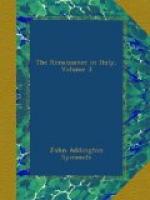[339] See the letters of Cosimo de’ Medici, Gotti, pp. 301-313, the letter of Count Alessandro da Canossa, ibid. p. 4, and Pier Vettori’s letter to Borghini, about the visit of some German gentlemen, ibid. p. 315.
[340] See the story as told by Torrigiani himself in Cellini, ed. Le Monnier, p. 23.
[341] After saying that he talked of love like Plato, Condivi continues: “Non senti mai uscir di quella bocca se non parole onestissime, e che avevan forza d’ estinguere nella gioventu ogni incomposto e sfrenato desiderio che in lei potesse cadere.” Compare Scipione Ammirato, quoted by Guasti, “Le Rime,” p. xi.
[342] Her intense affection for the Marquis of Pescara, to whom she had been betrothed by her father at the age of five, is sufficiently proved by those many sonnets and canzoni in which she speaks of him as her Sun.
[343] See Grimm, vol. ii.
[344] See the Sonnets translated in my Appendix and in my Sonnets of Michael Angelo and Campanella, London, Smith & Elder, 1878. See also the letters to Cavalieri, quoted by Gotti, pp. 231, 232, 234. It is surely strained criticism to conjecture, as Gotti has done, that these epistles were meant for Vittoria, though written to Cavalieri. Taken together with the sonnets and the letter of Bartolommeo Angiolini (Gotti, p. 233), they seem to me to prove only Michael Angelo’s warm love for this young man.
CHAPTER IX
LIFE OF BENVENUTO CELLINI
His Fame—His Autobiography—Its Value for the Student of History, Manners, and Character, in the Renaissance—Birth, Parentage, and Boyhood—Flute-playing—Apprenticeship to Marcone—Wanderjahr—The Goldsmith’s Trade at Florence—Torrigiani and England—Cellini leaves Florence for Rome—Quarrel with the Guasconti—Homicidal Fury—Cellini a Law to Himself—Three Periods in his Manhood—Life in Rome—Diego at the Banquet—Renaissance Feeling for Physical Beauty—Sack of Rome—Miracles in Cellini’s Life—His Affections—Murder of his Brother’s Assassin—Sanctuary—Pardon and Absolution—Incantation in the Colosseum—First Visit to France—Adventures on the Way—Accused of Stealing Crown Jewels in Rome—Imprisonment in the Castle of S. Angelo—The Governor—Cellini’s Escape—His Visions—The Nature of his Religion—Second Visit to France—The Wandering Court—Le Petit Nesle—Cellini in the French Law Courts—Scene at Fontainebleau—Return to Florence—Cosimo de’ Medici as a Patron—Intrigues of a petty Court—Bandinelli—The Duchess—Statue of Perseus—End of Cellini’s Life—Cellini and Machiavelli.




